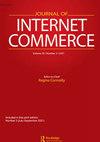移动商务采用与增强现实:印度移动商务服装购买研究
IF 4.1
Q2 BUSINESS
引用次数: 24
摘要
摘要本研究考察了拟人化和增强现实(AR)对消费者采用移动商务的态度和意向的影响。一项基于问卷的调查对541名emba学生进行了调查,这些学生以前从未使用过ar媒介的移动商务从零售品牌购买商品。采用SPSS软件和AMOS 21构建结构方程模型对我们的概念模型进行检验。结果表明,ar中介移动商务的人格化正向影响消费者信心、创新感知和ar中介移动商务主观规范,进而正向影响消费者对ar中介移动商务的态度。同时,ar媒介移动商务的人格化对冷嘲热讽和产品使用障碍有负面影响,而冷嘲热讽对ar媒介移动商务的态度有负面影响。因此,本研究确立了人格化ar介导的移动商务对态度有积极影响,并促进了移动商务的采用。这一信息对新兴市场的零售业至关重要,它填补了AR和移动商务文献中一个显著的知识空白,证明拟人化有助于激发消费者信心,消除消费者对AR介导的移动商务的疑虑。它还验证了在新兴市场应用技术接受模型时,信心和愤世嫉俗取代了感知易用性和感知有用性。本文章由计算机程序翻译,如有差异,请以英文原文为准。
On m-Commerce Adoption and Augmented Reality: A Study on Apparel Buying Using m-Commerce in Indian Context
Abstract The present study examines the impact of anthropomorphism and augmented reality (AR) on consumers’ attitudes and intention to adopt m-commerce. A questionnaire-based survey was conducted amongst 541 Executive MBA students who had never previously used AR-mediated m-commerce to purchase merchandise from a retail brand. SPSS and AMOS 21 were used to construct a structural equation model to test our conceptual model. The results indicate that anthropomorphization of AR-mediated m-commerce positively affects consumer confidence, perception of innovativeness, and subjective norms attributed to AR-mediated m-commerce, which in-turn positively affect the attitude toward AR-mediated m-commerce. Simultaneously, anthropomorphization of AR-mediated m-commerce negatively affects cynicism and product usage obstructions, whereas cynicism negatively affects attitudes toward AR-mediated m-commerce. Consequently, the study establishes that anthropomorphizing AR-mediated m-commerce positively affects attitude, and it promotes the adoption of m-commerce. This information is crucial for retail industries in emerging markets, and it fills a notable knowledge gap in the AR and m-commerce literature by demonstrating that anthropomorphism helps to stimulate consumer confidence and dispel consumer doubts about AR-mediated m-commerce. It also validates the replacement of perceived ease of use and perceived usefulness with confidence and cynicism when applying the technology acceptance model in emerging markets.
求助全文
通过发布文献求助,成功后即可免费获取论文全文。
去求助
来源期刊

Journal of Internet Commerce
BUSINESS-
CiteScore
10.50
自引率
7.00%
发文量
18
期刊介绍:
The business world has undergone many changes because of information technology, and the impact of the Internet may cause one of the biggest yet. While many people use the Internet for educational and entertainment purposes, organizations and companies are looking for ways to tie their internal networks to this global network to conduct electronic commerce. While companies have been conducting business electronically with suppliers and customers for many years, conducting online commerce via the Internet offers even greater opportunities for multinational, national, and even small businesses to cut costs, improve efficiency, and reach a global market.
 求助内容:
求助内容: 应助结果提醒方式:
应助结果提醒方式:


